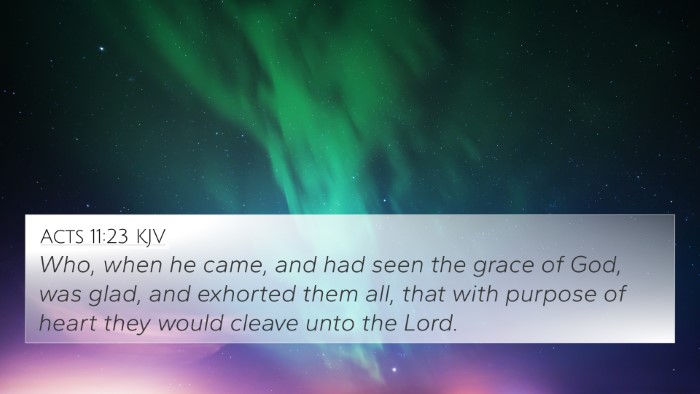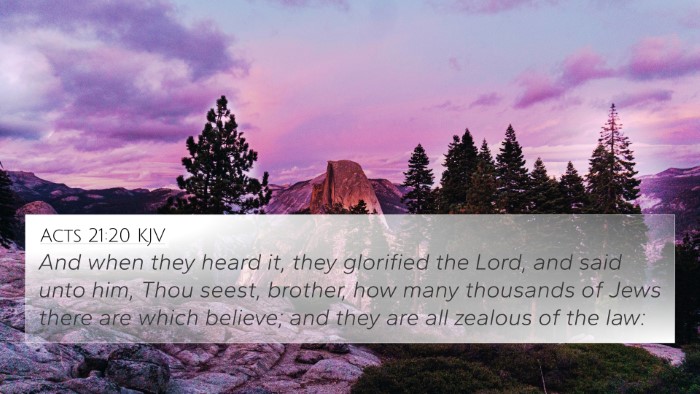Understanding 1 Corinthians 1:4
The Apostle Paul's letter to the Corinthians is rich with insights about grace and thanksgiving. In 1 Corinthians 1:4, Paul expresses gratitude to God for the grace bestowed upon the Corinthian believers. This verse sets the tone for the entire epistle as it emphasizes the transformative power of divine grace.
Verse Text
"I thank my God always on your behalf, for the grace of God which is given you by Jesus Christ."
Commentary Insights
Let's explore what prominent biblical commentaries reflect about this passage.
1. Matthew Henry's Commentary
Matthew Henry emphasizes the necessity of Thanksgiving in the life of a believer. He notes that the Apostle Paul illustrates an essential aspect of Christian leadership by thanking God regularly for the gifts and graces present in the lives of others. This gratitude is a reminder to Christians of the importance of recognizing God's work in one another.
2. Albert Barnes' Notes on the Bible
Albert Barnes points out that Paul uses "grace" in a broader sense which encompasses all spiritual blessings and gifts that the Corinthian church has received. He highlights that Paul attributes every commendable quality and spiritual gift within the church to God's grace, suggesting that their strengths should encourage humility and reliance on God.
3. Adam Clarke's Commentary
Adam Clarke elaborates on the impact of grace in the early church, stressing that grace is not merely unmerited favor, but also a transformative force. He underlines that for Paul, the grace given by Jesus Christ was pivotal in enabling the Corinthians to live as a testimony of God's power and love.
Cross-References and Thematic Connections
This verse can be related to several other biblical texts that highlight the themes of grace, gratitude, and spiritual gifts:
- Romans 1:21 - Acknowledges the importance of gratitude toward God.
- 2 Corinthians 9:15 - Paul thanks God for his inexpressible gift, reflecting the grace given to believers.
- Ephesians 1:6 - Praises the grace of God, which is seen in the beloved (Christ).
- Philippians 1:3 - Refers to thanking God upon every remembrance of others, echoing Paul's sentiment.
- 1 Thessalonians 5:18 - Encouragement to give thanks in all circumstances, aligning with Paul's approach.
- Colossians 3:16 - Urges believers to let the word of Christ dwell richly, fostering a community of gratitude.
- James 1:17 - Speaks of every good gift and perfect gift being from above, reinforcing the biblical principle of grace.
- 1 Peter 4:10 - Highlights the idea that each believer has received spiritual gifts to serve one another.
- Romans 12:6-8 - Discusses the diverse gifts conferred by grace and their purpose in the church.
- Galatians 5:22-23 - Lists the fruits of the Spirit, which are manifestations of God's grace in believers' lives.
Conclusion on the Importance of Cross-Referencing
The exploration of 1 Corinthians 1:4 through cross-referencing highlights the interconnectedness of biblical themes. Utilizing tools for Bible cross-referencing allows believers to identify and examine the relationships between various scriptures, ultimately enriching their understanding of God's word.
Understanding these connections and recognizing how verses correlate enriches our study of the scriptures and helps us grasp the overarching themes of grace, gratitude, and the essence of being part of the body of Christ.
How to Use Cross-References Effectively
Effective cross-referencing can be accomplished through:
- Utilizing a Bible concordance to locate similar themes.
- Employing a Bible cross-reference guide to understand contextually related scriptures.
- Engaging in cross-reference Bible study for deeper insights into God's word.
- Incorporating technology, such as Bible study apps that feature cross-references.
Final Thoughts
The richness of biblical text emerges when we engage in comparative Bible verse analysis, establishing thematic connections and exploring the profound inter-Biblical dialogue that exists.
By understanding passages like 1 Corinthians 1:4 through the lens of its cross-references, believers are better equipped to appreciate the depth of God's grace and eternal purpose for His Church.













